Against the odds: Chaparral senior faces more than academic obstacles in diploma quest
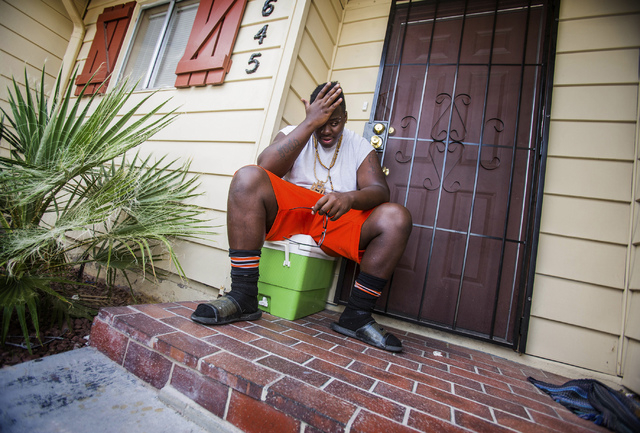
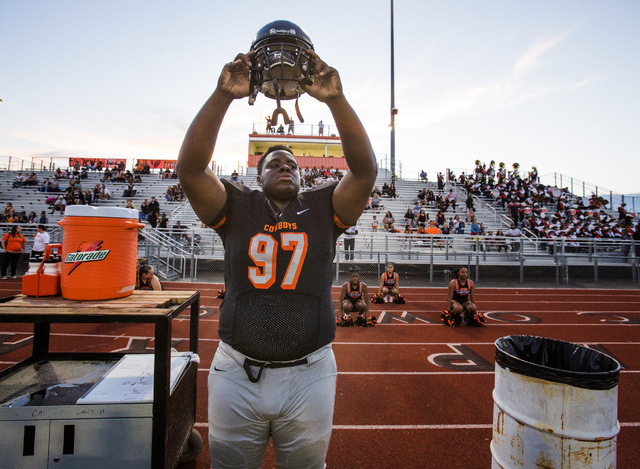

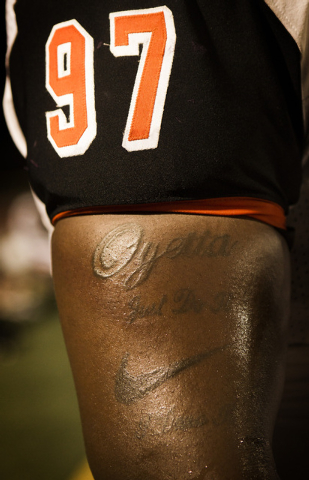
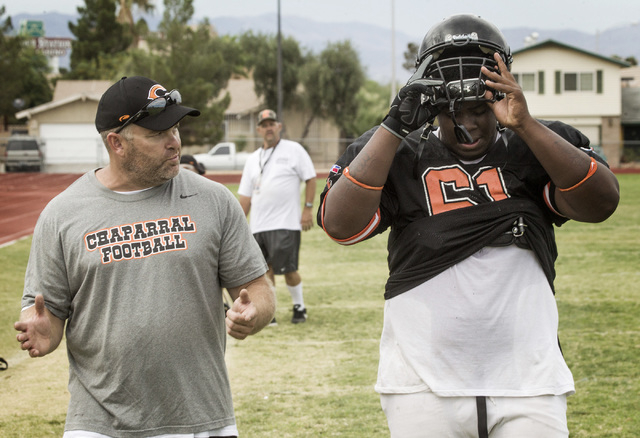

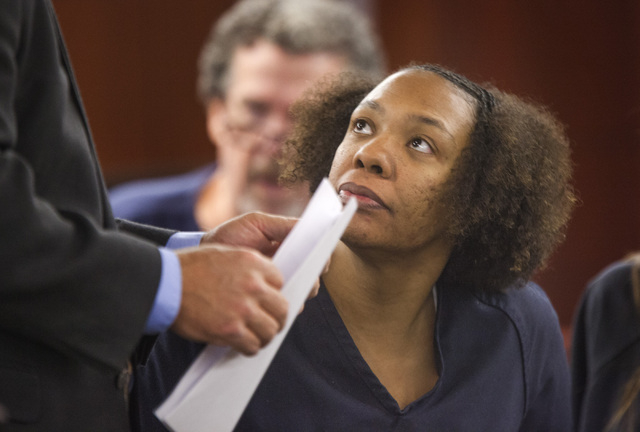

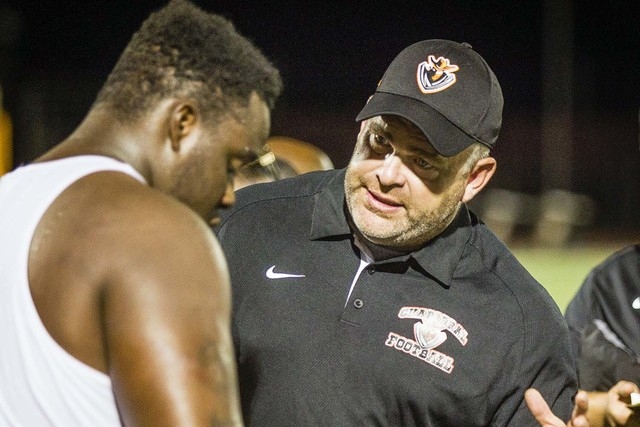
Alone with his girlfriend in a hospital room, James “Bubba” Dukes cradles his sleeping daughter against his chest.
He sways while he studies her every feature. She purses her lips. Dukes returns the gesture.
“She loves her daddy,” says Dukes, who was moved to call his own father after his daughter, Nehemiah, was born on Aug. 24, 2013. “Why I called, I don’t know.”
At 6 foot 3 inches and a solid 315 pounds, Dukes is an 18- year-old high school student about to start his senior year. He’s the oldest boy among 10 children raised on the edge of homelessness by a single mother.
He welcomes his daughter into the chaos of his family life two days before classes begin at Chaparral High School, a struggling southeast valley school that may be the best place for Dukes. With a host of support programs established in the past three years for at-risk students — more than what’s offered at any other Clark County School District campus — Chaparral often fills the role of surrogate parent to teens in need.
And Dukes’ need is great. His mother has been arrested. Why, he doesn’t know. His younger brothers and sisters were placed in emergency care at Child Haven until his 73-year-old grandmother moved back from Ohio to care for them. His 19-year-old sister, plagued with a chronic illness, fell into a days-long coma after she apparently stopped taking her medication.
“There’s a lot of bumpy roads right now,” says Dukes, referring to everything but the birth of his daughter.
Dukes awkwardly holds Nehemiah’s head of silky black curls against his thick, tattooed forearm. Stretched and faded, the words “Lil Floyd” have stained his skin since age 12, a memorial to the baby brother who died in his arms of an asthma attack. He looks at his daughter and knows one thing.
“I’m not going to give up on school,” he pledges. “It can’t be like this, not our whole life. Somebody got to get us out of here.”
He sees football as his ticket out of the poverty, instability and crime that surrounds him. He has been called National Football League material by college scouts who courted him as a junior with talk of athletic scholarships. To be eligible, he needs a high school diploma.
Dukes sets his sights on graduating from Chaparral, a school with battles that mirror his own and that of other troubled students. As a student, he has been chronically behind, missing kindergarten and parts of several grades as his family moved from place to place in Las Vegas.
“It’s a lot, but I got to do it,” Dukes says of the goal that will test his fortitude and ability to overcome multiple obstacles. He needs to complete more than two years of coursework and pass Nevada’s four high school exit exams after having failed them multiple times. “I don’t want my daughter growing up the way I had to grow up. I don’t want her struggling how I had to struggle, at all. ”
‘NO MATTER WHAT’
Aug. 27, 2013. Regional Justice Center.
Four women shuffle into a courtroom with their hands and feet shackled. They sit on a front bench, the letters “CCDC” stamped across the back of their blue jumpsuits. Above the collar of the jail garb worn by Dukes’ 39-year-old mother, Oyetta Trotter, the words “Sin City” sweep across her neck.
Across town at Chaparral, her second-oldest child starts his second day of school. Sweat beading on his forehead and soaking through the front of his T-shirt, Dukes focuses on pushing 375 pounds off his chest. He is deep into the day’s weight training, but his mind drifts downtown.
“I hope they let her out,” worries Dukes, who was 8 years old when his mother was convicted for being the lookout in a purse snatching. That landed him in Child Haven, the county’s shelter for abused and neglected children. “I cried every day in there.”
He replays memories of his mother, who now faces bad check charges.
“The one thing she always said before she left: ‘No matter what happens, I’ll always love y’all. If I don’t be here by tonight, tomorrow, I’ll always love you,’” recalls Dukes. “I always wondered (where she went), never asked her. I’d just say, ‘OK. I love you too.’ ”
Dukes’ attention is jarred back to the present by his coach, a square-jawed, hulking man with a silvering five o’clock shadow and a crew cut beneath a ball cap.
“Bubba! Bubba!” shouts Bill Froman. “Let’s shrug together. Get the station set up.”
“Yes, sir,” says Dukes, putting 500 pounds on the bar and chalk on his hands.
Froman met Dukes three years ago when he took over Chaparral’s football program. He convinced the sophomore to join the team though Dukes couldn’t play a down and was ineligible. As a freshman, Dukes skipped one out of every two school days.
“Coaches told me to get rid of Bubba,” says Froman, whose relationship with Dukes extends beyond the football field. He drives him to school, feeds him, gives him practice gear. The coach even visited Dukes and his newborn baby in the hospital. “Football could be a way out for him.”
At Chaparral, Dukes receives an array of academic supports — tutoring, a longer school day, one-on-one interventions, credit-recovery courses and extra counselors — that all started his sophomore year when a three-year, $2.5 million federal grant made Chaparral a “Turnaround School.” The grant’s mandate: Replace the principal and most the staff, then turn around the school’s faltering performance by the time Dukes’ class graduates in 2014.
Like Dukes, the 2,300-student school was well behind expectations, graduating just 34 percent of seniors in 2011, the worst rate of any high school in the nation’s lowest-ranked state for public education, according to the most recent Kids Count report. As sophomores, 22 percent of Dukes’ class started the year behind on credits. Dukes was worst off — zero credits.
By his junior year, Dukes was a rebounding student and had discovered football. As a star player, he was a big part of the reason Chaparral won its first season-opener in six years and posted three victories to six losses in the 2012-13 season. The losing record was a milestone for the team, which had won only two games in its previous three seasons for a record of 2-25.
As a senior, it’s clear that Dukes — still way behind with just 9.5 credits — needs even more help to reach the 22.5 credits required to graduate.
In Chaparral’s weight room, Dukes holds on to the bar with both hands and shrugs against 500 pounds.
“Don’t quit till you throw up,” Froman tells a grunting Dukes. “Don’t quit.”
‘START PLAYING’
The Chaparral Cowboys’ football season opener pits them against the Pahrump Valley Trojans on Aug. 30, 2013.
His back to the end zone, Dukes braces to hold the line, balancing 300 pounds on the balls of his feet. He waits for that crucial moment, a grunt from the Pahrump quarterback that sends bodies clashing. He lands on his back.
“Touchdown, Pahrump,” a voice announces over the loud speaker as Pahrump ties the game at 6-6 approaching halftime.
Froman bounds onto the field, whipping his baseball cap off with one hand as he swipes the other over his head.
“Bubba, start playing football,” he yells from the 30-yard line. “You’re getting your ass kicked.”
Dukes struggles to his feet, something he will have to do off-field in coming weeks as his family is forced out of their home. Dukes’ mother, still in the Clark County Detention Center, lost the family’s Section 8 rent subsidy because she stopped paying the bills.
Dukes’ grandmother, Margaret Cole, moves the family to a two-bedroom apartment behind the Eastside Cannery on Boulder Highway.
In October, Dukes visits the apartment for the first time after having moved in with his girlfriend’s family and his daughter. Dead bushes and dirt lead to the apartment’s front door. Across the way, a red paper seal clings to an apartment door, marking a crime scene. A pit bull watches Dukes from another apartment window, its head poking from beneath a hanging sheet.
Dukes is tackled by his five sisters, ranging in age from 5 to 10. He gives $5 bills to each, even his 3-year-old brother Champ. Cole tells him to come home, though it means another mouth to feed on her retirement funds and food stamps.
“I worry about you. You getting fed over there?” Cole asks of Dukes.
The fiery, warm woman who coughs often and doesn’t have a bedroom, wakes before dawn to cook for the children and tutors them in the evenings.
“You don’t understand, Grandma. I want to be here,” replies Dukes, holding Champ in his arms.
“I’m going to be big like you,” says Champ, waving his new money.
“I can’t take it around here,” says Cole, a college-educated social worker trying to keep her daughter’s family together. She’s now living like her former clients, receiving public assistance and killing bugs in the bathtub, sometimes swatting them off her grandchildren’s clothes. “This is depressing. But I had to find a place for all these kids.”
Dukes leaves 30 minutes later to tuck in his baby. He gives $50 to his 17-year-old brother Maharie for food and takes a letter from his jailed mother. On the way home, Dukes buys dinner for him and his girlfriend, Dajee Hill, refusing to let her mom feed him.
“I’m more comfortable buying my own food,” says Dukes, who cleans carpets on the weekends with a man from his girlfriend’s church.
Struggling to decipher his mom’s cursive writing, Dukes reads the letter and cries. “It’s really killing me, seeing this letter and where they’re living.”
A SEA OF TROUBLES
As fall progresses, Dukes’ pursuit of a diploma stalls. He comes to school but sometimes skips classes. Principal David Wilson ultimately assigns a football coach/special education aide to escort Dukes from class to class. He also learns that Dukes’ 6-year-old sister Fatoshanay went missing on Oct. 23, after being picked up at school by former neighbors of the family who used to baby-sit for the girl. By then, Dukes, his girlfriend and baby have moved in with Dukes’ grandma and his siblings.
Children sleep on couches and twin mattresses that have to be propped against the wall during the day. Dukes’ mother is still in jail awaiting her next hearing. She is accused of trying to sign over a $508.91 forged check at the Palms casino.
Cole has discovered that the neighbors who took Fatoshanay have applied for temporary custody. The judge granted it after twice serving Trotter in the detention center with notice of the custody hearing, which Trotter says she never received.
“Every time Bubba has an opportunity to walk through that door, something else devastating happens in his life, pulling him back,” Wilson says.
Dukes isn’t an anomaly at Chaparral and other schools like it. Almost all of his students struggle in some way, Wilson says. He has examples. The students who cut through the football field fence to sleep on the high-jump mats. The mother who fed her teen daughter meth to keep her thin and energetic enough to work as a prostitute. One girl told her Chaparral counselor that she wore the same shirt every day because her parents forced her out and she’s living on the streets.
“For Chaparral, no, it’s not extraordinary. It’s the sad situation,” Wilson says.
Dukes, Wilson says, has been hit particularly hard.
“Bubba has had that perfect storm,” says Wilson, a tall, thick-framed man in a suit and tie. He’s well-aware he and staff usually don’t know what students are up against.
Teachers see only “tips of the iceberg,” says 20-year Chaparral English teacher Bonnie Moses, who pulls out an essay written by a senior. It’s a letter to a father the student never met and his mother who abandoned him.
“You broke my heart when you left me in the seventh grade. I could never figure out why. You said we would never separate, you promised. You said you would make up for my father but chose the life of crime instead.”
Dukes’ little sister, Fatoshanay, remains with the family’s old neighbors for 2½ months. Cole’s anxiety builds as she awaits a Jan. 9 hearing to regain custody of her granddaughter.
“My stomach has just been in knots,” the grandmother says as the weeks roll on. “I’ve been throwing up. I don’t sleep at night. I’m awake all the time, wondering.”
LEARN TO FINISH
By November, Dukes’ mother has been released from the Clark County Detention Center to Henderson authorities for an unrelated charge of a $587 bad check. She pleads guilty and must pay fines on both charges and hold down a job, something she hasn’t done in years.
“What I did, I won’t do no more,” Trotter tells the judge at Henderson Municipal Court on Nov. 7, 2013. “I had money issues.”
When she returns home at 10 that night, the children jump to their feet and embrace their mother’s legs. Trotter hugs them back and sticks a cigarette behind her right ear to pick up her granddaughter.
“Don’t she look like me?” Trotter asks.
“Told you, Bubba, she’d say your daughter looks like her,” Cole adds.
Later, Cole and Trotter walk outside for a smoke. Cole tells Trotter the latest news about Fatoshanay.
Trotter stubs out her cigarette and goes inside to eat ice cream with her kids. Cole stays outside, alone. A cigarette dangles from her left hand and a coffee mug hangs from the right. She hears the children laughing inside.
“Yes, Lord. Yes. I need a rest,” she says.
Champ cracks open the door and says, “I love you, Grandma.”
After the Jan. 9 custody hearing for Fatoshanay, the family remains incomplete. Guardianship Commissioner Jon Norheim continues the matter to the end of the month, and Dukes storms out of the courtroom.
Marshals tell him to let the couple holding his sister leave first.
Dukes walks out anyway, muttering, “How can they steal my sister?” Marshals follow, threatening to arrest him if he doesn’t calm down.
“Look at what they go through,” Wilson says of Dukes and his students. “Yet, at that same time, our expectation is, ‘You will come to school. You will succeed. And you will graduate.’ ”
The family finally gets Fatoshanay back. Trotter signs over full custody of the six youngest children to Cole, knowing her criminal history hurts the case. Cole says she eventually plans to move back to Ohio with them.
Family crises resolved by the end of January, Dukes has five months left until graduation. He’s passing most of his courses, but not all the online classes needed to catch him up.
The school has written a recovery plan for Dukes, laying out his steps to graduation. He believes it’s doable.
“Finish every class you’re in and pass them all. Take some summer courses. You’ll graduate,” Froman tells Dukes. “Learn how to finish in your life. Do a difficult task when you don’t want to.”
“Yes, sir,” Dukes replies. Always, it’s “Yes, sir.”
Principals at all Clark County School District high schools have been ordered to make recovery plans for failing seniors. It’s an attempt to improve the district-wide 2011 graduation rate of 59 percent. Principals find more than half of Clark County’s 20,000 seniors are in desperate straits.
Dukes falters in his push toward graduation, dropping out of night school before winter’s end and sometimes staying for only part of the school day during the first half of spring semester. He takes on work as a club bouncer, and Principal Wilson understands why. Dukes wants to provide for his family.
“He doesn’t always go about it the best way,” Wilson says. “He’s still thinking short term. That’s the example he’s had in his own life, and that seems to be the same path he’s walking down right now, even though it’s the last thing he wanted.”
By mid-March, Dukes has disappeared from school.
Contact Trevon Milliard at tmilliard@reviewjournal.com or 702-383-0279. Find him on Twitter: @TrevonMilliard.

BUBBA’S STORY
As a Chaparral High School junior, James “Bubba” Dukes was a promising football player buffeted by personal crises as he fought to fulfill his potential.
The story of the student and the school is chronicled in a three-part Las Vegas Review-Journal series.
Part 1: As a senior, his battle to graduate intensifies, mirroring Chaparral’s own struggle to help students like Dukes succeed.
Part 2: Many hands offer help to the Chaparral High School senior, a teen father reaching for a diploma that’s his key to a football scholarship and his stepping stone out of poverty.
Part 3: Graduating, always a long shot for Dukes, becomes even more unlikely. With less than three months to graduation, the football player hoping for an athletic scholarship is still short a year’s worth of credits.
Also, see this photo feature with images taken in 2012:













